The Super-Hero Car, by Dennis O’Neil
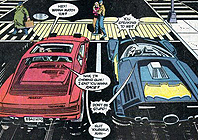 When we last looked in on our intrepid, tv-watching old guy – that’d be me – he was waiting to treat himself to the premiere of Knight Rider, a remake of an old series.
When we last looked in on our intrepid, tv-watching old guy – that’d be me – he was waiting to treat himself to the premiere of Knight Rider, a remake of an old series.
 When we last looked in on our intrepid, tv-watching old guy – that’d be me – he was waiting to treat himself to the premiere of Knight Rider, a remake of an old series.
When we last looked in on our intrepid, tv-watching old guy – that’d be me – he was waiting to treat himself to the premiere of Knight Rider, a remake of an old series.
 Once again, the other day, I found myself wishing I’d spent less of my youth with, as folks might have said back then, my nose buried in some silly book and more time in the company of hammers, saws, wrenches. You know. Manly stuff. Tools. The reason was, something in the bathtub wasn’t working and we had to call the plumber, who is one of the nicest guys I know and might be the best plumber in Rockland County New York, and we had a chat while the water was running to accomplish something arcane and, well, plumberish. If I hadn’t wasted my youth, maybe I could tell you what.
Once again, the other day, I found myself wishing I’d spent less of my youth with, as folks might have said back then, my nose buried in some silly book and more time in the company of hammers, saws, wrenches. You know. Manly stuff. Tools. The reason was, something in the bathtub wasn’t working and we had to call the plumber, who is one of the nicest guys I know and might be the best plumber in Rockland County New York, and we had a chat while the water was running to accomplish something arcane and, well, plumberish. If I hadn’t wasted my youth, maybe I could tell you what.
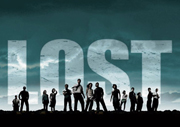 [EDITOR’S NOTE: Denny’s column normally runs on Tuesdays, which is great because Denny e-mails it to me on Sundays. For some reason – and for the second or third time – his various e-mail accounts don’t seem to like my various e-mail accounts. We think we’ve straightened it out. Go figure. If computers were cars, we’d all be riding horses.
[EDITOR’S NOTE: Denny’s column normally runs on Tuesdays, which is great because Denny e-mails it to me on Sundays. For some reason – and for the second or third time – his various e-mail accounts don’t seem to like my various e-mail accounts. We think we’ve straightened it out. Go figure. If computers were cars, we’d all be riding horses.
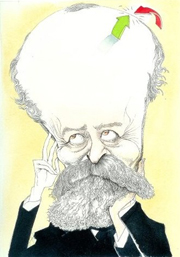 Big game day. As I sit down to write this, the coin toss that will start this year’s Superbowl is about 90 minutes away. Let a hush fall over the universe. The Pats and the Giants are preparing to vie for godlike supremacy. Who’s your favorite QB – Eli or Tom? Me – I’m going for the Giants, not because I know anything about them, but rather because Marifran likes the Patriots and we have this annual bet. Winner gets to choose the next movie. Call us sports.
Big game day. As I sit down to write this, the coin toss that will start this year’s Superbowl is about 90 minutes away. Let a hush fall over the universe. The Pats and the Giants are preparing to vie for godlike supremacy. Who’s your favorite QB – Eli or Tom? Me – I’m going for the Giants, not because I know anything about them, but rather because Marifran likes the Patriots and we have this annual bet. Winner gets to choose the next movie. Call us sports.
Wonder what William James would have thought of the Superbowl?
William James, brother of Henry, as the English majors and philosophy fans among you probably know, launched the concept of the “moral equivalent of war.” Although he was a self-proclaimed pacifist, he recognized that war has its uses – he even declared that history would be “insipid” without it. And it does. It hastens technological development, helps young men understand others who are not of their tribe, offers an opportunity for individuals to test themselves (and maybe learn what they really feel), provides an opportunity to develop managerial skills…You can probably add to the list.
War also kills and maims the innocent and destroys economies and nations and minds and brutalizes the survivors and gives money and power to those least deserving of them, such as men who have never fired a shot except, maybe, at forest animals and who knows? – even then the shooter might miss his target and hit a companion instead. Feel free to add to this list, too.
The trick, then, according to James and like minds, is to find a way to do the good things war does, and omit the bad. It’s a trick nobody has learned how to do. But we have some activities that approximate war that don’t do significant harm and may do some good, and sports is one of them. It allows young folk to obey their evolutionary imperative to engage in strenuous physicality with the goal of beating someone or something and maybe copping some glory and admiring glances and, please, let us not knock that imperative; it helped our distant, burrow-dwelling ancestors to claim a home on the Earth’s surface after a big chunk of rock did in the dinosaurs.
 Calling movie actors “stars” was appropriate when I was a midwestern lad, long ago, because they seemed as distant and unattainable as those celestial twinklers that speckled the summer sky. None of my friends or relatives were movie stars — they were butchers or clerks or drivers or printers — and what the stars did, acting, wasn’t a real job and so those who did it weren’t real people. They were…stars. But if you knew someone who knew, or at least had spoken to, one of these distant beings who lived in places you never expected to visit, the stars became somehow real — or maybe realer, anyway. They were, if not people, then some sort of demi-people.
Calling movie actors “stars” was appropriate when I was a midwestern lad, long ago, because they seemed as distant and unattainable as those celestial twinklers that speckled the summer sky. None of my friends or relatives were movie stars — they were butchers or clerks or drivers or printers — and what the stars did, acting, wasn’t a real job and so those who did it weren’t real people. They were…stars. But if you knew someone who knew, or at least had spoken to, one of these distant beings who lived in places you never expected to visit, the stars became somehow real — or maybe realer, anyway. They were, if not people, then some sort of demi-people.
Clark Gable was a star. But Rock Hudson was both more and less than a star because I knew a girl who had worked as an extra on one of his films. Julia Adams…heck, she was a person, because she did a personal appearance at the grocery co-op my father belonged to when she was co-starring with Tyrone Power in Mississippi Gambler and people I knew actually saw her in the flesh. And didn’t that make Power a demi-person, too, by association?
Which brings us to Heath Ledger. I was never in a room with him, never saw him on the street, spoke to him on the phone, none of that. But when a heard about his death a few days ago, I felt just a tiny bit worse than I usually feel when someone whose work I admire passes. Why? Mr. Ledger and I lived in two of the same neighborhoods, one in Brooklyn and one in Manhattan, though not at the same time, and my big 2007 project was writing a novel based on the script of a movie Mr. Ledger performs in. Somehow, all this makes me feel a dim and distant connection to him.
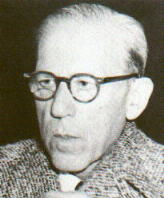 It seems to me that I used to hear the word “morality” a lot more than I do nowadays. That might have a simple explanation: I used to hear
It seems to me that I used to hear the word “morality” a lot more than I do nowadays. That might have a simple explanation: I used to hear
Look, sorry, I gotta break in here for a minute. You don’t know me unless, maybe, you once read an online thing called The O’Neil Observer and ain’t that a laugh. Like anybody would want to observe that loser! Well, one of those guys who studies bugs…an ente-something – maybe a guy like that would be interested in observing chrome-dome O’Neil. Anyway, I was introducing myself. Name’s Randy Hyper and I’m a character the loser made up because he’s too wussy to tell people about what’s he’s doing and he needs to hide behind a scrap of fiction to do it and if that ain’t pathetic, I don’t know what is. What he’d like you to know about is a course in comics writing he’s supposed to teach at New York University beginning February 13th and you could sign up for by contacting NYU. Or you could hit your toe with a hammer. That’s all I got to say. Now back to Mr. I’m-Too-Modest-To-Talk-About-Myself.
people use the word “immoral” when they mean something like, “I really, really don’t like this.” It’s been suggested – I don’t remember by whom – that the great bete noire of the comics world, Dr. Fredrick Wertham, whose background was European high culture and whose wife did fine art, found comic books unbearably vulgar and that perception of vulgarity somehow morphed into a perception of immorality and, worse, psychological corruption.
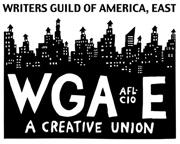 And the Screen Writers Guild lurches into a tenth week and if there’s any end in sight, I haven’t heard about it.
And the Screen Writers Guild lurches into a tenth week and if there’s any end in sight, I haven’t heard about it.
Last time, I mentioned the Academy of Comic Book Arts and its failure to do any significant negotiating on behalf of its members. ACBA wasn’t the first attempt, though, to organize those glorious mavericks, the comic book community. In the 60s…
Wait! Better issue a warning before I go further. Do not regard anything that follows as gospel. (In fact, you might consider not regarding the Gospel as gospel, but let us not digress.) I have no reason not to believe what I’m about to tell you except one: About a year before he died, Arnold Drake, who was a busy comic book writer at the time we’ll be discussing, told me that the story I had wasn’t the whole story, or even necessarily accurate. I don’t know why I didn’t press him for further information, but I didn’t.
Okay, the story:
 The television and movie Writers Guild strike lurches into its ninth week. If it goes on much longer, we may be doomed to even more staged “reality” and contest shows. Might be a good time to rekindle a book reading habit.
The television and movie Writers Guild strike lurches into its ninth week. If it goes on much longer, we may be doomed to even more staged “reality” and contest shows. Might be a good time to rekindle a book reading habit. New Year’s morning. Cold, wet, bleak.
New Year’s morning. Cold, wet, bleak.
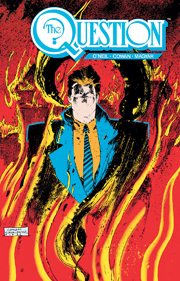 Danny and Fred were the last two kids in their grade to still believe in Santa Claus.
Danny and Fred were the last two kids in their grade to still believe in Santa Claus.